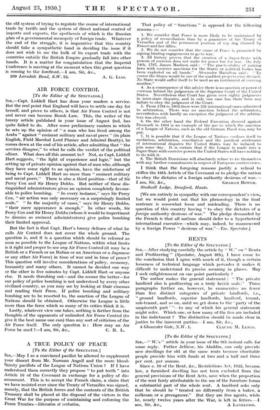A TRUE POLICY OF PEACE [To the Editor of the
SPECTATOR.] SIR,—May I as a convinced pacifist be allowed to supplement your dissent from Mr. Norman Angell and the more blood- thirsty pacifists of the League of Nations Union ? If I have understood them correctly they propose " to put teeth " into Article 16 of the Covenant in exchange for a policy of dis- armament. This is to accept the French claim, a claim that we have resisted ever since the Treaty of Versailles was signed, namely, that the British forces and the contents of the British Treasury shall be placed at the disposal of the victors in the Great War for the purpose of maintaining and enforcing the Peace Treaties—littera/An et verbatim.
That policy of " Sanctions " is opposed for the following reasons:
1. We consider that Peace is more likely to be maintained by a policy of reconciliation than by a guarantee of the Treaty of Versailles and of the permanent position of top dog claimed by France and her Allies.
2. We do not consider that the cause of Peace is promoted by signing binding engagements to go to war.
3. All history proves that the creation of a Super-State with powers of coercion does not make for peace but for war. On July 14th, 1787, James Madison said " The practicability of making laws with coercive sanctions for the States or political bodies has been exploded on all hands." Alexander Hamilton said "To coerce the States would be one of the maddest projects ever devised. No State would suffer itself to be used as an instrument of coercing another."
4. As a consequence of this advice there is no sanction or power of coercion behind the judgments of the Supremo Court of the United States. Nevertheless that Court has given over eighty judgments in inter-state disputes, and in only one case has there been any failure to obey the judgment of the Court. 5. From 1794 to 1903 there were 231 international cases submitted to arbitration. There was no sanction behind the arbitrators, nevertheless with hardly an exception the judgment of the arbitra- tors was obeyed. 6. On the other hand the Federal Execution decreed against Denmark in 1664 is an example of the use to which the sanction of a League of Nations, such as the old German Bund was, may be put. 7. It is possible that if the League of Nations confines itself to mediation, arbitration, conciliation and the juridical settlement of international disputes the United States may be induced to join some day. It is certain that if the League is made into a Super-State with coercive powers the United States will have nothing to do with it.
S. The British Dominions will absolutely refuse to tie themselves with any further commitments in respect of European controversies-
I think that the foregoing reasons justify a refusal to stiffen the 16th Article of the Covenant or to pledge the nation to obey the dictates of a foreign authority desirous of war.—
I am, Sir, &c., GRAHAM BOWER. Studwelt Lodge, Droxford, Hants.
[We are entirely in sympathy with our correspondent's view, but we would point out that his phraseology in the final sentence is somewhat loose and misleading. There is no question of this country having " to obey the dictates of a foreign authority desirous of war." The pledge demanded by the French is that all nations should defer to a hypothetical international executive—which may, indeed, be manoeuvred by a foreign Power " desirous of war."—En. Spectator.]
































 Previous page
Previous page